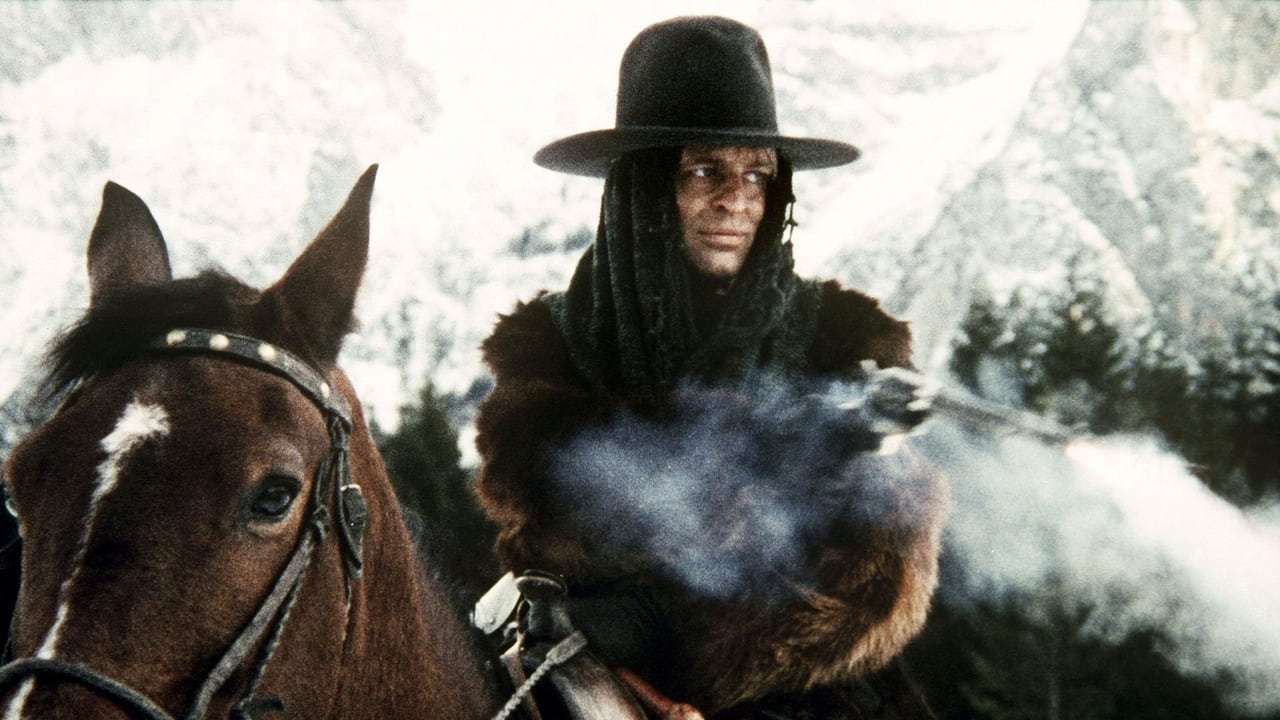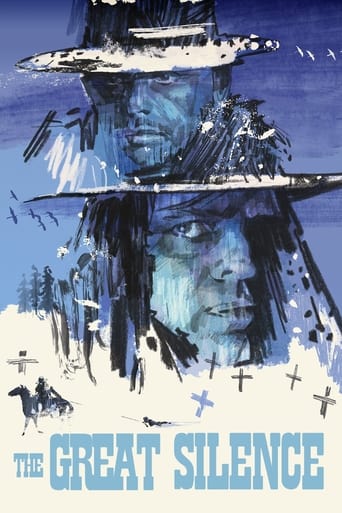

I love this movie so much
... View Moregood back-story, and good acting
... View MoreAbsolutely brilliant
... View MoreIt is an exhilarating, distressing, funny and profound film, with one of the more memorable film scores in years,
... View MoreI watched The Great Silence for the first time last night. There is no doubt in my mind that this film is easily amongst the best spaghetti westerns ever made. I do feel this is better than Django. The Sergio Corbucci films I'd previously seen seemed very hit and miss. The photography sometimes looked rough, complete with shaky zooms. The photography in The Great Silence however is generally superb. Some wonderful wide shots and a number of other beautiful shots, the camera does pan about very well. The film is set on a snow swept landscape and it looks terrific, it also contains a wonderful, haunting score from Ennio Morricone. On an unforgiving, snow-swept frontier, a group of bloodthirsty bounty hunters, led by the vicious Loco (Klaus Kinski) prey on a band of persecuted outlaws who have taken to the hills. As the price on each head is collected - one - by - one, only a mute gunslinger named Silence (Jean-Louis-Trintignant) stands between the innocent refugees and the greed and corruption that the bounty hunters represent. It's hard to believe this film was made in 1968, it is very impressive for many reasons. First it does not follow most genre conventions, it simply follows it's own set of rules, the ending is especially different. It's well cast, I thought both of the male leads were perfect. There is a very good moment where the mute gunslinger and a coloured woman make love. This scene is really unusual and quite daring for the time. This is a very bleak film, which may put some people off. I happen to think the ending is brilliant.
... View MoreIn "The Great Silence", Klaus Kinski plays a wonderfully horrid guy. While he is technically on the side of the law as a 'bounty killer' (I think this was a mistranslation and should have been 'bounty hunter'), his methods are despicable. If he shoots some of the family of the wanted men, he has no problem with this. He also routinely promises to bring in his prey for a fair hearing--and then shoots them dead! Clearly, he has issues.After Kinski (playing, appropriately, a guy named 'Loco') butchers a particular man, his surviving widow is furious and commissions a mute man named 'Silence' (Trintignant) to kill Kinski. Considering that Silence's family was butchered and his throat was cut (making him unable to talk) by bounty hunters, naturally he takes the commission. His plan is to provoke Loco to draw on him and then kill him legally in self-defense. However, there are two things in his way. First, Loco knows he's no match for Silence and vows never to draw his gun on him. Second, the local sheriff hates Loco but doesn't want his town turning into a shooting gallery. In fact, to stop all the butchering, the sheriff arrests Loco and spirits him out of town. That, of course, does not end it and in the end there is a HUGE and very bloody shootout.Aside from the very unsatisfying ending, this is one of the better Italian westerns I have seen. I loved the snowy scenes which set it apart from other westerns. It also is very much like director Corbucci's other westerns in that it is almost a political statement and has a lot to do with the little guy standing up against oppressive legal authorities. But, it's also much better than the other Corbucci films--mostly because it was a bit more restrained and the music wasn't so repetitive. When it came to the acting, I especially liked the snarling Kinski--he was easy to hate. As for Trintignant, he really didn't have a lot to do and as heroes go, he wasn't especially compelling--especially at the incredibly grim and nasty ending. As far as the ending goes, it is interesting that the disc also includes a happy ending apparently shot for some markets--though it lacks sound and may never have actually been used.By the way, isn't it ironic that this Italian western is about a mute AND the DVD has no captions whatsoever?! My deaf daughter couldn't have watched the film with me unless I sat there and interpreted the entire movie! Now THAT'S loco!
... View MoreCorbucci's brutal western recreates the Snow Hill, Utah, massacre of 1898, and pulls no punches in doing so. Jean-Louis Trintignant stars as not only the man with no name (complete with cheroot), but the man with no voice. Jean-Louis looks quite at home on the range which is more than can be said for his nemesis and bounty hunter Klaus Kinski who wears a fur coat so huge, he looks like he stepped out of his friend's (Herzog) documentary about bears.The subtitled dialogue is pretty terrible and the Italian cast with their cissy haircuts don't exactly exude authenticity as cowpokes. Combine all this with a lack of respect for the 'code of the west', epitomised in an ending which is beyond bleak, and you begin to see why western purists hate the spaghetti offshoots so much. It's not so much their revisionism as a destruction of a nation's imagined history. Visually, it's a stunning piece of work, from trademark close-ups to atypical snowy landscapes it's a visual treat while Ennio Morricone's score comprising classical and ambient electronics, is superb and worthy of a separate listen. Overall, though, I'd say 'spaghetti' is something of misnomer here, this is more like raw meat.
... View MoreI love spaghetti Westerns but have never seen one filmed in 'snow-filled mountains' The long distance shots were fantastic and this must have been a grueling film shoot not only for the actors and crew, but especially the horses! When I'd see a horse collapse in the snow I thought, "I sure hope that 'no animals were harmed in the making of this film'! The horses were trudging though 3 - 4 feet of snow sometimes and there were a couple of 'snow-blind' camera shots where you couldn't even see anything. The gun shot sounds were the usual 'small cannon Italian gun echo'y sound' but that didn't bother me and is just standard in an Italian Western. Music was haunting and the dubbing wasn't bad at all. Throw in evil giant blue eyed psycho Kinski (playing the character 'Loco')and you've got yourself a hit! Lastly and most importantly is the ending. I can't say enough for the ending to this epic saga of good vs. evil. I just sat their astonished at the ending and realized that I don't think I've ever seen an ending that 'Realistic'!? I'm sure a lot of you would not agree (but some of you film fan purists would, and it threw me 'way off guard' but I came to like the ending and thought it really rang true! One of the best 'truest' Western endings I've ever seen! I don't want to give away any spoilers but seriously, I have never seen a film end in 'such a manner'. Stick with this movie and you will be rewarded. If not rewarded at least this movie will make you think or kind of bother you for a couple of days and those are my favorite kind of films!! Fantastic 1968 Film and glad I finally got to see it in 2010!
... View More